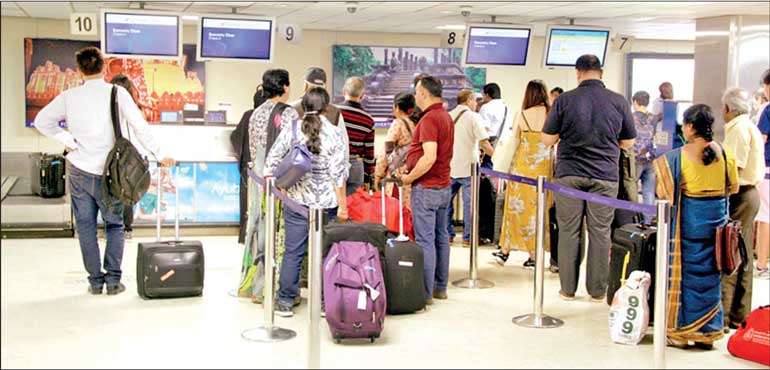Saturday Feb 21, 2026
Saturday Feb 21, 2026
Friday, 24 February 2023 00:10 - - {{hitsCtrl.values.hits}}

Given the huge outflow of qualified staff looking to improve their livelihoods by migrating overseas, how can we use the vocational training system to fill the vacuum created by skilled migration?
 Sri Lanka has seen a record high labour migration in 2022 as tens of thousands of people moved to other countries in search of jobs in foreign currency following the economic crisis. Unlike during the last days of the war, young people are now running away to protect their livelihoods. Labour market reforms are therefore required urgently to improve economic performance of the country post-bankruptcy.
Sri Lanka has seen a record high labour migration in 2022 as tens of thousands of people moved to other countries in search of jobs in foreign currency following the economic crisis. Unlike during the last days of the war, young people are now running away to protect their livelihoods. Labour market reforms are therefore required urgently to improve economic performance of the country post-bankruptcy.
Data suggests that changes in employment laws that lower the costs of hiring workers and restructuring will only foster job creation and help firms to recover from the emerging economic shocks.
Generally the common criticism of our Labour Legislation has been the issue of it having outlived its shelf life, turned less business-friendly, too many layers of compliance, time-consuming and also, in some sectors, pro-labour.
The need to attract investors who are keen to use local talent and develop businesses in Sri Lanka should become our top priority. Similarly, according to employers they see a reluctance of youth to take up regular employment and have a preference for casual work, therefore we need to address the need for proper education and emphasis on skills which would attract youth to take up regular employment because of the possibility of a stable and decent life. This then requires proposals for labour market reform, also considering the revamping of secondary and tertiary education/vocational training which will be a means of attracting better quality employees with the right trainability. The link between education and quality employment is also tied up with the dignity of the jobs available.
Migration of talent
Given the huge outflow of qualified staff looking to improve their livelihoods by migrating overseas, how can we use the vocational training system to fill the vacuum created by skilled migration? Today top employers instead of offering job security, are emphasising their role in ensuring the ‘employability’ of their workers, by which they mean the generic skills that may be transferable across firms. How can we build on this strategy in Sri Lanka and give our talent the climate to stay put in Sri Lanka? The traditional notion of education and training as investments that could generate returns, both to employers in the form of increased output and to employees in the form of higher wages still holds water. How do we then strengthen linkages between the labour market reforms with the education reforms to better address the skills mismatch and talent shortage? How can we ensure that the labour market reforms help to improve the employment situation of vulnerable workers? These need answers from our policymakers.
Conclusion
Experts say the current volatility of unemployment and inflation is due to economic shocks, rather than changes done to regulation. This evidence suggests that the rise and persistence of unemployment was due to macroeconomic shocks, rather than to a progressive tightening of labour market regulation. So should we worry too much then about labour market regulations? Data suggest that aggregate effects of employment protection regulation generally has a negative effect on economic growth and productivity and richer countries tend to have more flexible labour laws and positively related to trade reforms.
In Sri Lanka evidence also suggests that some employment protection laws could help to decrease inequality without huge negative effects on economic growth. So we need a balanced approach to policymaking. Most employers are no longer able to guarantee job security in the way they might have done some years ago, resulting in reductions in job tenure and increasing mobility of workers to crisscross across firms. In the final analysis HR practices must go beyond the traditional labour laws/practices and deliver a superior employment value proposition to deal with the current skilled labour migration and to address the nation’s training gap. There is a lot to learn from India.
Reference:
Key labour reforms needed for economic recovery ft.lk
https://www.ft.lk/Opinion-and-Issues/Despite-all-our-pleading-for-change-in-labour-laws-nothing-has-changed-for-the-better/44-673731